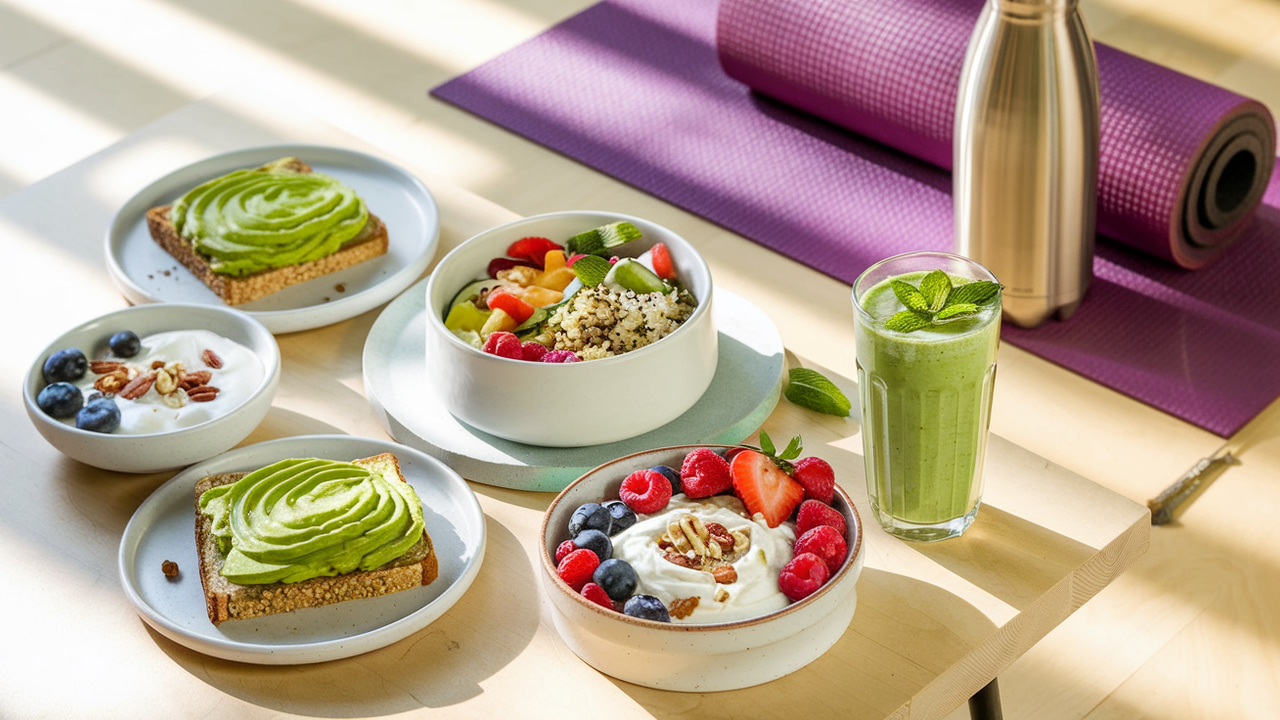
Foods to Power Your Yoga Fat-Burning Sessions
Discover how thoughtful food choices fuel your yoga practice and support effective fat-burning.
What You’ll Learn
- How nutrient timing and food selection impact fat metabolism during yoga sessions.
- Effective strategies to incorporate proteins, healthy fats, and carbohydrates for sustained energy.
- Tips for leveraging vitamins and minerals to naturally boost metabolism.
- Practical advice paired with actionable steps and expert insights.
Nutrient Timing for Maximum Yoga Energy
Understanding when to fuel your body is as important as what you eat. Consuming nutrient-packed foods 30-60 minutes before your yoga session can help elevate your energy levels and set the stage for an effective fat-burning workout. Consider a small snack with a balanced mix of proteins, carbohydrates, and healthy fats to prime your muscles and metabolism.
For more details on how proper nutrition aids your yoga routine, check out our guide to Essential Nutrition Principles for Yoga Weight Loss.
Research from Healthline supports the idea that small, well-composed snacks can improve exercise performance.
Incorporating Protein for Sustained Energy
Protein is essential for muscle repair and recovery, especially when engaging in fat-burning yoga sessions. Foods such as Greek yogurt, lean chicken, and plant-based proteins (like lentils and quinoa) provide a steady stream of energy and help sustain your performance through lengthy sessions.
To learn more about balancing your macronutrients for peak performance during yoga, read our piece on Balancing Macronutrients for Yoga Success.
Studies published by the American Council on Exercise indicate that incorporating moderate protein before exercise supports muscle endurance and overall stamina.
Carbohydrates: The Primary Source of Quick Energy
Carbohydrates are your body’s primary fuel, especially during dynamic yoga sessions where quick energy is needed. Opt for complex carbohydrates like whole grains, fruits, and vegetables that release energy gradually, ensuring your workout remains effective without a sudden energy crash.
Dive deeper into the basics of nutrition and its role in your yoga journey in our article Essential Nutrition Principles for Yoga Weight Loss.
For additional context and expert advice, review insights on carbohydrate management from Medical News Today.
Healthy Fats: The Unsung Heroes
Often overlooked, healthy fats are vital for hormone regulation and can be a reliable source of sustained energy during long yoga sessions. Incorporate foods such as avocados, nuts, seeds, and olive oil into your diet. A small portion before practice can help improve endurance without weighing you down.
Our guide on Meal Plans to Complement Your Yoga Routine offers examples of meals that seamlessly incorporate these fats while balancing other key nutrients.
Consider the benefits endorsed by research on the Mediterranean diet, which emphasize the role of healthy fats in overall metabolic health.
Vitamins and Minerals: Boosting Metabolism Naturally
Micronutrients such as vitamins and minerals are essential for converting food energy into usable fuel during yoga. Foods rich in antioxidants, B vitamins, magnesium, and iron—like leafy greens, berries, and nuts—can enhance your metabolic rate and support recovery post-session.
For an expanded discussion on how to tailor your meals for improved performance, check out our article on Meal Plans to Complement Your Yoga Routine.
Further insights can be found on nutrition sites such as Nutrition.org.uk, which elaborate on the metabolic benefits of essential vitamins and minerals.
Comparison Table: Foods & Their Nutritional Benefits
| Food Type | Calorie Content (per serving) | Macro Distribution | Primary Benefits |
|---|---|---|---|
| Greek Yogurt | 100-150 | High Protein, Moderate Carbs | Muscle repair & steady energy |
| Whole Grain Bread | 80-120 | High Carbs, Low Fat | Sustained energy release |
| Avocado | 160-200 | High Healthy Fats | Hormonal balance & satiety |
| Mixed Nuts | 150-200 | Balanced Fats & Protein | Energy boost & metabolic support |
You can also add your own suggestions to this table as you discover new nutrient-dense foods that work for your yoga routine.
Frequently Asked Questions
- What are the best pre-yoga snack options?
- Snacks like Greek yogurt with berries, a small portion of whole grain toast with almond butter, or a protein smoothie are excellent choices before a yoga session.
- How do healthy fats contribute to my energy levels during yoga?
- Healthy fats provide a long-lasting energy source and support hormone regulation, critical for sustained performance and effective fat burning.
- Are carbohydrates necessary for fat-burning yoga sessions?
- Yes, complex carbohydrates offer a gradual release of energy, which is essential for maintaining performance and preventing energy crashes during yoga.
- How can vitamins and minerals impact my yoga performance?
- They play a vital role in metabolic processes, helping the body convert food into energy and aiding in muscle recovery after intensive sessions.
- Can I mix and match these foods in my diet?
- Absolutely. A balanced diet that incorporates a variety of protein sources, carbohydrates, healthy fats, and micronutrients will support your overall yoga performance.
Recap
Next Article section
If you found these insights valuable, consider exploring another in-depth discussion that focuses on meal planning for yoga enthusiasts. With tailored Meal Plans to Complement Your Yoga Routine, you can transform your weight loss journey with tailored meal plans that boost your yoga performance and vitality: Meal Plans to Complement Your Yoga Routine.
This guide provides a comprehensive strategy to balance your meals, ensuring you get optimal nutrients to support yoga and overall wellness.
Ready to Elevate Your Yoga Sessions?
Now that you have a detailed understanding of how to power your yoga fat-burning sessions with the right foods, it’s time to take actionable steps toward a balanced diet and energized practice. Experiment with these food choices and strategies, and track how they enhance your performance.
Stay committed to your practice, and let each meal fuel your progress. Share your experiences and insights with our community for ongoing support and inspiration.